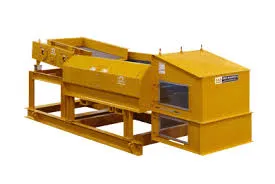

Dec . 04, 2024 06:45 Back to list
The Importance of Scrap Metal Plants in the Circular Economy
In today’s increasingly resource-constrained world, the role of scrap metal plants has become more vital than ever. These facilities are not just recycling centers; they are essential components in the circular economy, where waste is transformed into valuable resources. Scrap metal plants process discarded metal materials, enabling them to be reused in manufacturing new products, reducing the reliance on virgin materials, and minimizing environmental impact.
The circular economy aims to create a closed-loop system in which materials are reused, refurbished, and recycled, thereby conserving resources and sustaining the environment. Scrap metal plants play a crucial part in this system by collecting various kinds of metal, including steel, aluminum, copper, and brass, which are abundant in urban environments. These metals often come from old vehicles, appliances, construction debris, and industrial scrap. By channeling these materials back into the economy, scrap metal plants help prevent them from ending up in landfills, where they would contribute to soil and water pollution.
One of the significant advantages of recycling scrap metal at these plants is the energy savings associated with metal production. For instance, recycling aluminum saves up to 95% of the energy required to create new aluminum from bauxite ore. Similarly, recycling steel can save around 74% of the energy needed for new steel production. These energy savings not only reduce greenhouse gas emissions but also decrease the overall carbon footprint associated with metal production. Given that the steel industry is one of the largest sources of industrial greenhouse gas emissions, the role of scrap metal processing becomes even more crucial.
Moreover, scrap metal plants contribute to job creation and economic growth. They often employ a diverse workforce, ranging from laborers who handle the physical processing of metal to skilled technicians who manage operations and logistics. In many communities, these plants provide essential employment opportunities and stimulate local economies. The revenues generated by the recycling of scrap metal can also lead to investments in further technological advancements and better processing techniques, promoting efficiency and sustainability.

Technological advancements have also played a significant role in enhancing the capabilities of scrap metal plants. Innovations in sorting and processing technologies allow for more precise separation of different types of metal, increasing the quality of recycled materials. Automated systems and robotics are being integrated into operations to improve efficiency and reduce labor costs. Additionally, data analytics is aiding plant operators in optimizing their processes, which not only increases productivity but also minimizes waste.
Consumer awareness and commitment to sustainability have increased over the years, leading to a higher demand for recycled metal. Families, businesses, and policymakers alike are recognizing the environmental benefits of recycling, leading to more comprehensive waste management programs that prioritize recycling initiatives. Many people are also becoming more conscious of the products they purchase, seeking those made from recycled materials. This shift in consumer behavior reinforces the importance of scrap metal plants, as they are at the forefront of providing these essential resources.
However, the scrap metal industry is not without challenges. Price fluctuations in the global market can impact operations, and illegal activities such as metal theft can pose risks to scrap metal plants. Additionally, increasing regulatory requirements concerning health, safety, and environmental standards necessitate ongoing investment in compliance and monitoring systems.
In conclusion, scrap metal plants are crucial to promoting sustainable practices within the framework of the circular economy. By facilitating the recycling and repurposing of metal materials, they help conserve natural resources, reduce energy consumption, create jobs, and minimize environmental impact. As global awareness of sustainability continues to grow, the importance of these facilities will undoubtedly elevate, making them cornerstone contributors to a greener future.
Latest news
Troubleshooting Common Eddy Separator Problems
NewsJul.04,2025
The Role of Metal Recycling Plants in Circular Economy
NewsJul.04,2025
The Impact of Recycling Line Pickers on Waste Management Costs
NewsJul.04,2025
Safety Features Every Metal Shredder Should Have
NewsJul.04,2025
How Industrial Shredders Improve Waste Management Systems
NewsJul.04,2025
How Cable Granulators Contribute to Sustainable Recycling
NewsJul.04,2025